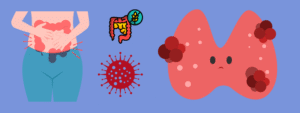Celiac disease is an autoimmune complaint where the susceptible system of the body responds abnormally to gluten (a protein complex in wheat, barley, and rye), which is significantly impacted on the small intestine and is triggered by gluten intake. The symptoms and complications associated with coeliac complaint are very diverse and can involve other organs other than the gastrointestinal tract.
What happens in celiac complaint?
The body of a person with celiac complaint reacts to the protein when he or she eats or drinks commodity containing gluten. This ruins their villi, little cutlet-like extensions established along the wall of the small intestine. Injury to your villi means that your small intestine is not absorbing food nutrients correctly. eventually, this may result in malnourishment and even symptoms such as weakened bones to mood swings to confinement.
Experimenters guess, that not more than 20 of complainants receive the correct opinion. The destruction of your intestine is practically gradual, and the symptoms are different in each case. Celiac complaint does not mean gluten dogmatism or gluten perceptivity. The symptoms of gluten dogmatism may serve some of the digestive symptoms of celiac complaint. However, individuals having gluten dogmatism do not exhibit a sensitive reaction or harm to the small intestine.
Celiac Disease vs. wheat mislike :
Celiac complaint is not a food mislike, and therefore the symptoms are different. But you may have itchy or watery eyes or difficulty breathing, when you are antipathetic to wheat, but you eat commodity containing wheat.
Is celiac complaint serious?
Although the complaint of celiac is not usually life- hanging, it may cause severe complications and symptoms when not treated. undressed celiac complaint also increases your risk of certain types of cancer. The symptoms of celiac complaint are very diverse in each individual. Others do not show any, but the complaint may be injuring their bowel. still, the complaint may be manifesting itself in many parts of your body, In case you have it.
You can experience digestive symptoms soon after consuming or drinking commodity containing gluten. Common symptoms include
- Stomach pain
- Gas
- bloating Diarrhea (sometimes constipation)
- frazzle
- fatigue
- Weight loss
- Anemia (low blood count)
- Slow growth in children
- Skin rash (dubbed dermatitis herpetiformis)

You may experience other symptoms as time goes by since your body is not receiving adequate nutrients. They include
- Anemia
- Bone or joint pain
- Blistery rash (itchy, it is called herpetiformis by the croakers)
- Headaches
- Fatigue
- Weakened bones
- Mood changes
- Mouth ulcers
- dental problems
Problems with the nervous system, such as numb or chinking hands or bases, balance issues, or mindfulness alteration Reduced spleen function (hyposplenism) Weight loss Celiac complaint symptoms in ladies.
There are symptoms that are specific to women (and those who were assigned as womanish at birth). They can be the result of malnutrition and/ or the sensitive reaction of your body to gluten. They consists of Irregular Ages ,Early Menopause Confinement. undressed celiac complaint has been attributed to gravidity (trouble getting pregnant) in ladies .
Symptoms of celiac complaint in children:
Children with celiac complaint have a higher likelihood of having intestinal problems, including
- Bloating or belly swelling
- Constipation
- Diarrhea Pale,
- foul- smelling poop
- Upset stomach or puking
- Weight loss
nonetheless, the issues that they may experience are such as If celiac complaint prevents the absorption of the nutrients that a child requires. Anemia Destroyed tooth enamel Retarded Puberty in infants, inability to thrive huffiness or mood swings.
Neurological problems like
- learning disabilities
- attention deficiency hyperactivity complaint (ADHD)
- Slow growth
- short height
- Celiac rash (dermatitis herpetiformis) 1 in 4 individuals with a complaint of celiac develops an itchy blistering rash. It occurs more in adults as compared to children, and in men as compared to women. It is most prevalent in the following regions Buttocks, Elbows, Knees, Crown Lower back.
Celiac Disease Causes and threat Factors:
Causes of celiac complaint:
Your susceptible system reacts abnormally to gluten, which causes celiac complaint. Your weak system responds to the relatively harmless protein as though it is a nuisance to your system and forms antibodies against it. This inflames your gut(lump) and destroys your villi resulting in the symptoms of celiac complaint. It is not quite obvious why this response occurs.

Scientist point of view:
Scientists assume that celiac complaint has a significant impact on individuals with some changes in genes (mutations). However, not all of the people with the mutation will receive the complaint. Croakers guess that celiac complaint can be triggered by an effect that is stressful to your body and susceptible system, like a viral infection, surgery, gestation, or emotional trauma.
Risk factors of celiac complaint still, as a parent or stock, you are 1 in 10 chances of having celiac complaint, when one of your immediate family members has celiac complaint. Similar to many vulnerable diseases, it is more prevalent in women (and other people associated as womanish at birth). They constitute 60- 70 of the people who are diagnosed with the condition. The complaint is also most prevalent in the white and people with other conditions, including.
- Hashimoto’s thyroiditis
Type 1 diabetes Addison complaint.
- Down pattern
- Rheumatoid arthritis
- Turner pattern (a disorder where a lady lacks an X chromosome)
- Multiple sclerosis(MS)
- Autoimmune hepatitis
- Sjogren’s pattern
- Idiopathic ballooned cardiomyopathy.
- IgA nephropathy
- Lupus
- perverse bowel pattern(IBS) habitual pancreatitis
- Psoriasis Scleroderma
- Williams pattern
- Primary biliary cirrhosis
- Lactose dogmatism
- Intestinal carcinoma
- Intestinal cancer
Common four myths about celiac:
Myth 1: Celiac disease is just a food allergy:
- Food allergies are associated with the production of IgE antibodies by the immune system and tend to produce immediate responses such as hives, swelling, or difficulty breathing.
- Celiac disease is not an allergy but an autoimmune disease. When gluten is consumed, the immune system will generate various antibodies and will attack the small intestine.
- Compared to food allergies, the damage of celiac accumulates with time and may lead to long-term consequences such as osteoporosis, infertility, and even intestinal cancer in case of untreated disease.
Myth 2: Only children get celiac disease:
- Celiac disease may occur at any age.
- Some children experience early signs such as diarrhea, poor growth or irritability. However, most adults are later diagnosed with such problems as anemia, fatigue, bone pain or depression.
- Delayed diagnosis is a common thing- many adults spend years with unexplained health issues before celiac is diagnosed.
- It has been found that in the present days, more adults are actually diagnosed with celiac disease than children.
Myth 3: You can eat “a little bit” of gluten without harm:
- Even minute quantities (such as crumbs off a cutting board, a spoon, or oil in which breaded food is fried) can cause the autoimmune reaction.
- The response is not necessarily associated with immediate symptoms, yet intestinal damage occurs.
- Regular consumption of a small amount of gluten predisposes the body to severe health complications like malnutrition, neurological and gastrointestinal cancers.
- This is the reason why it is so important to avoid cross-contamination and prevent it.
Myth 4: Going gluten-free is just a diet trend:
- Gluten-free diets have been the rave in recent years as a weight loss or healthy living diet, and this fact makes some people dismiss celiac disease as a fad.
- An individual with celiac disease cannot afford to have a gluten-free diet as an option, it is the only cure.
- Unlike trends, this diet is supposed to be life-long and strict. Even the occasional exposure to gluten will reverse the healing process.
- Only a choice: a gluten-free diet without medical necessity is just a choice, whereas a gluten-free diet is a medical necessity to celiac patients.
- Celiac disease can be acquired at any age. However, it is most likely to be diagnosed:
- In children aged 8 months to 1 year (at the onset of intake of gluten containing foods)
- In adults who are in the midlife, aged 40-60.
There are those individuals who have had celiac disease over the years before they receive the appropriate diagnosis that it is a rare disease, a nonage disease, or an aversion to food. Nevertheless, it is a common disease and can happen to any person at any age and is an autoimmune complaint triggered by gluten. You also cannot grow out of it and you need life long strictly gluten free diet to help in long term health complications. Briefly Celiac disease is severe, chronic and autoimmune – not a food intolerance, not restricted to children, not safe even in the presence of small amounts of gluten, and definitely not a fad diet.
